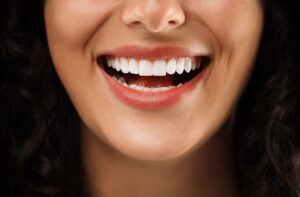When most people consider smoking, they tend to associate it with risks like heart or lung disease. Indeed, the medical health risks of smoking are well documented. According to the CDC, cigarette smoking is responsible for around 1 of every 5 deaths in the United States. But what about smoking and oral health? Did you know that tobacco secretly sabotages oral health? This post highlights the damage smoking does to the mouth, teeth, and gums and provides some tips to protect your smile. So, without further ado, let’s dive in and take a closer look.
5 Shocking Ways That Smoking Impacts Your Oral Health
#1 Tooth discoloration
Stained teeth are one of the most visible effects of smoking on oral health. The nicotine and tar in tobacco smoke can cause the tooth enamel to turn yellow, gray or brown over time. Brushing the teeth several times a day only goes so far. Smoking stains are stubborn and difficult to remove as they settle into the enamel. However, thorough dental cleaning provided by a hygienist can work wonders and leave the teeth sparkly clean. Or for more dramatic results, why not consider professional teeth whitening performed by our dentist? You never know, a beautiful white smile may be the motivation you need to quit smoking!
#2 Greater risk of gum disease and tooth loss
Smokers have double the risk for gum disease than non-smokers, and the more you smoke, the greater your risk becomes. Gum disease causes inflammation and infection in the soft tissues surrounding the teeth and occurs when plaque accumulates around the gumline. Smoking can also worsen existing gum conditions and if left untreated, the disease can escalate to periodontitis, eroding the bone structure supporting the teeth and causing teeth to loosen or fall out.
Furthermore, smoking makes it harder to detect the early signs of gum disease, as tobacco reduces blood flow to the gums. This poor blood supply can mask common symptoms, like bleeding gums, which is often an early warning sign of gum disease. It’s crucial to see your dentist for regular checkups as they can detect gum disease (and other problems) in its early stages and treat it before it progresses any further.
#3 Difficulty in healing after dental treatment
Patients who smoke should be prepared for a slower, more uncomfortable healing process after undergoing dental work such as extractions, gum surgery or implants. This is because smoking restricts blood flow and oxygen to the mouth’s soft tissues which, in turn, can prolong swelling and infection.
Another problem often faced by smokers after tooth extractions is ‘dry socket’ an often painful condition caused by an empty socket that is slow to heal. Smokers looking to have dental implants fitted are typically advised to quit smoking for several months to lower the chances of implant failure caused by delayed healing.
#4 Increased risk of mouth cancer
Here’s an alarming statistic for you. Approximately 90% of people with oral cancer are tobacco users and smokers are six times more likely than non-smokers to develop mouth cancer.
Mouth cancer is most likely to affect the side of the tongue, the lips, the floor of the mouth and the tonsils. The earlier oral cancer is detected, the better your chances of recovery – which is another reason why regular dental checkups are so important, and not just for smokers.
#5 Bad breath and loss of taste
One of the most unpleasant effects of smoking on oral health is bad breath, otherwise known as halitosis. It’s hardly surprising that the immediate cause of smokers’ breath is tobacco. Not only do the lungs retain some of the smoke even after the cigarette has been extinguished but chemicals also linger in the mouth. While brushing your teeth gets rid of bad breath temporarily, a more effective way to combat the problem is to stay hydrated by drinking plenty of water and chewing sugar-free gum to maintain saliva levels. You can also use mouthwash to freshen your mouth and add a boost of fluoride.
So now you’re more aware of the damage smoking does to your mouth, how can you fight back?
Preventing Teeth and Gum Problems in Smokers
If you smoke, there are several things you can do to prevent tooth and gum problems:
- The first, and most obvious, is to try and quit smoking. Not only does quitting lower your chances of developing gum disease and mouth cancer but it also improves your overall health. Speak to your doctor or dentist or call 1-800-QUIT-NOW – A free national helpline for advice and support in quitting smoking. Other associations that can help include: Smokefree.gov – A government-sponsored website offering tools and tips for quitting smoking. and the American Lung Association’s Freedom From Smoking – A proven program for smokers who want to quit, designed by the American Lung Association.
- Clean and brush your teeth and gums diligently at least twice a day with fluoride toothpaste to rid yourself of the plaque and tar buildup on teeth which leads to tooth decay and gum disease. Brush for a minimum of 2 minutes, longer where possible, and consider using an electric toothbrush which may be more effective at removing bacteria and plaque from the teeth. Oh, and don’t forget to brush your tongue.
- Floss once a day to get rid of food particles trapped between the teeth. If you find flossing difficult, then give interdental brushes a try. They are available in various sizes to suit your unique dental needs.
- Visit your dentist for regular checkups – Every six months is recommended if you’re a smoker.
- Stay hydrated to avoid having a dry mouth, particularly if you are taking any medications that dry your mouth. Drink plenty of water or chew sugar-free gums to stimulate your saliva production.
- Lower your alcohol consumption and avoid recreational drugs.
Final thoughts
Maintaining good oral hygiene is important, particularly if you’re a smoker. Simple steps like regular brushing, professional dental cleanings, and oral cancer screenings can make a significant difference. And remember, quitting smoking will not only transform your oral health but also improve your overall quality of life.
If you’re in Anchorage and looking for a dentist who understands your needs, reach out to Mint Dental today. Our friendly and experienced team is ready to help you keep your smile bright and healthy—whether you’re on the journey to quit smoking or just want to keep your oral health in top shape. Schedule an appointment by calling Mint Dental at (907) 318-7100 or use our online booking system.







